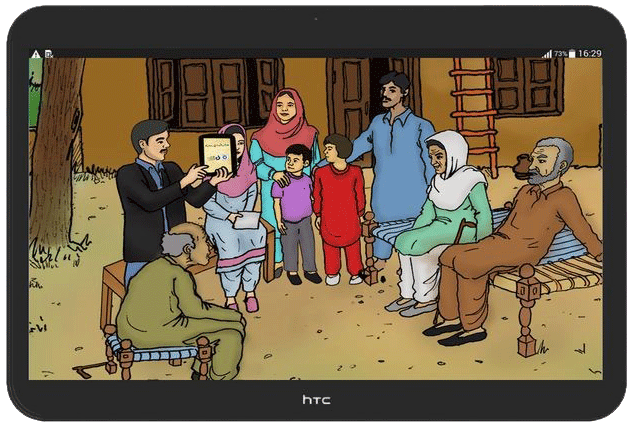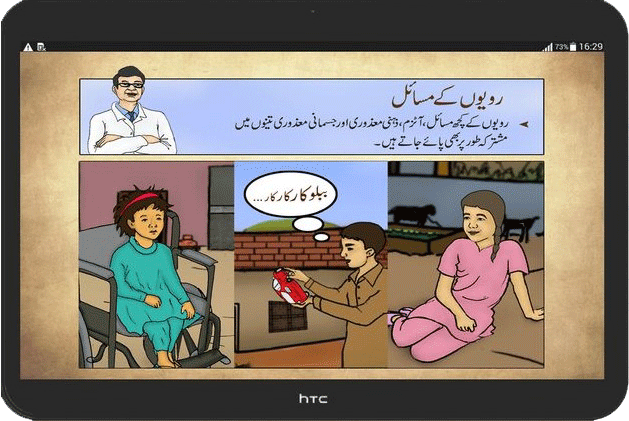FaNs give us the courage and strength to give our children the care they deserve
Who we are
Family Networks (FaNs) for Kids is a supportive network that uses technology to train families and caregivers who have a child with special needs including development disorders to help them care better for their children. FaNs aims at breaking down stigma and closing the care gap for children with developmental disorders in rural areas of Pakistan. FaNs does this by organising, training and empowering the families of affected children into potentially self-sustaining networks who are able to care for their own children and advocate for their needs to the community and the health system.
This model of service delivery was developed, implemented and evaluated in rural community settings of sub-district Gujar Khan (population of ~1 million), in Rawalpindi Pakistan. The program was successful in establishing 70 potentially self-sustaining Family Networks, consisting of 36 trained ‘Family Volunteers’ working under supervision of specialists, delivering brief, multicomponent parents’ skills training program to 270 families of children with developmental disorders. A community-based cluster randomized controlled trial evaluation of the program indicated that there was a significant improvement in ‘Quality of Life’ of caregivers of children with developmental disorders, living in low resource settings of rural Pakistan.
PROBLEM
Developmental Disorders is an umbrella term which includes intellectual disability and autism spectrum disorders. Developmental disorders usually onset in childhood and effects impairment, and causes delayed functioning related to nervous system maturation. Children with intellectual disabilities appear to have slow growth; they start to sit, walk and talk later than other children, they also have functional problems as they grow such as they cannot perform ordinary self-care, they have trouble dressing or feeding themselves. Moreover, they have poor development or understanding of social skills, they cannot follow social rules and customs such as taking turns or waiting in line. Similarly, they are unable to understand and avoid dangerous situations, thus they cannot be on their own. The developmental disorders are more prevalent in Lower- and Middle-Income Countries (LMICs) where families of children with developmental disorders do not have access to health care services. This increases burden on families and deprive children to have high quality of life. In Pakistan, over 6% of children suffer from a developmental disorder (including intellectual disorders and Autism Spectrum Disorder) and like many other low resource settings, most children and families receive no intervention or care. Specialist services are rare, concentrated in urban areas and inaccessible to the majority of the targeted population. There is considerable stigma and discrimination affecting children with developmental disorders and their families. Thus, the treatment gap for developmental disorders in rural Pakistan is almost 100%.
SOLUTION
FaNs leverages the power of families’ support and technology to deliver care in low resource settings. The network approach ensures support and quality care for the child internal to the family, whilst also building a voice for marginalized families against external stigma and exploit the use of technology to train non-specialists in delivering evidence-informed caregivers’ skills training program at-scale. This technology‑assisted, brief, multicomponent parents’ skills training intervention for children with developmental disorders, delivered through family volunteers, is effective to improve quality of life of caregivers of children with developmental disorders and is a potentially cost-effective way of closing the near 100% care gap for children with developmental disorders in Pakistan.
Impact
This model of service delivery was developed, implemented and evaluated in rural community settings of sub-district Gujar Khan (population of ~1 million), in Rawalpindi Pakistan. The program was successful in establishing 70 potentially self-sustaining Family Networks, consisting of 36 trained ‘Family Volunteers’ working under supervision of specialists, delivering brief, multicomponent parents’ skills training program to 270 families of children with developmental disorders. A community-based cluster randomized controlled trial evaluation of the program indicated that there was a significant improvement in ‘Quality of Life’ of caregivers of children with developmental disorders, living in low resource settings of rural Pakistan.
Model
FaNs uses a technology to organize, empower and train a network of family members of special needs children in rural areas. This cascading model leads to an expanding pool of trained human resource that is potentially self-sustaining and replicable more widely, both in different locations and other areas of mental health, through a university certification program (for details on the certificate program, please click here)
How does it work

TRAINING
Families are trained using an interactive tablet digital tool based on mhGAP guidelines, that presents ‘real life’ scenarios on psycho-education, parent skills training, physical health, parental stress, community participation, stigma and rights. The training narrates the lives of 3 avatar children who allow family members to discuss, to practice parent management skills through role play and to share problem-solving strategies.

CHAMPION FAMILIES
Once trained, families become ‘champions’ and are empowered to provide peer-supervision to 5-7 other families from their village allowing the model to scale up exponentially, meeting regularly to support each other in management of their children. Champions are supervised by health specialists once a month.

EMPOWERING THE NETWORK
The network members are supported to become an active group within the community. They campaign together for better facilities for the children in local schools and primary health care centers, and push to improve participation in community life.


